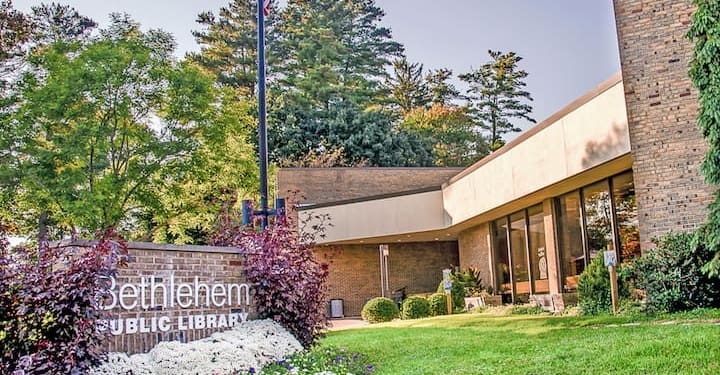Board asks director to reconsider length of ban and separately, asks Kirkpatrick to investigate any harassment claims arising from Dec. 5 talk
DELMAR – At its Jan. 8 meeting, the Bethlehem Public Library’s Board of Trustees upheld Library Executive Director Geoffrey Kirkpatrick’s determination that Bethlehem Neighbors for Peace violated a library policy by selling books on library premises. Without asking for a reduction, it directed Kirkpatrick to reconsider the length of the year-long ban on booking meeting rooms.
Board members Mark Kissinger and Caroline Brancatella voted against the motion.
“I think we should trust the executive director’s determination, and there’s no standard to reduce the penalty,” said board President Mark Kissinger explaining his no vote. “I think his decision was appropriate.”
Trustee Laura DiBetta, stated that notwithstanding repeated BNP policy violations, she thought a one year suspension was “a really long time, especially for a group that has a long history of successful programs and clearly is providing something for the community that is sorely desired.”
Kirkpatrick said that in coming up with the ban time frame, he looked at a comparable library policy addressing a repeat offense and the severity of the offense, which “seemed at the same level.” Given the repeated warnings to BNP, “it seemed an appropriate response,” he said.
At the Dec. 5 Miko Peled talk hosted by BNP, Kirkpatrick saw stacks of new books on the table right by the meeting room door.
“I’ve been to enough author talks,” he said. “I know what piles of books next to the entrance are at an author talk.”
In reviewing the suspension length, the board asked Kirkpatrick to consider any precedent that might be set and other local library directors’ experiences.
When asked for her opinion on the board’s vote Jan. 8 vote, BNP member Trudy Quaif said,” I’m not clear on what decision they made. I don’t know they made a decision.”
Fellow BNFP member Leslie Hudson said, “They’re not following due process of law. We have attorneys who will represent us.”
Kirkpatrick had advised BNP in writing that “selling is not allowed in the public meeting room” and that since BNP had been repeatedly warned, the group’s use of the library’s meeting room was suspended for one year until Dec. 11, 2024.
On Dec. 20, Quaif and Hudson, on behalf of BNP appealed the decision in a letter to the board president. In the letter, which was obtained through a FOIL request, BNP accused the library of using the book sale as a pretext “… of some in the community to suppress the rights of BNP to bring speakers of diverse perspectives.” BNFP also challenged the ban’s proportionality to the violation. Although BNP asserted it sold no books, it admitted it had been notified in 2019 it could not sell books in the library and that books were sold on Dec. 5.
“Leslie brought the books outside as her husband was returning Miko to his hotel,” the letter continued. “People rushed up to her and asked if they could have a book. She gave them out as a gift, but the takers approached Miko in the parking lot to have them signed and then paid him for them.”
At the Jan. 8 board meeting, Hudson acknowledged that “someone placed some books on a table by the door.” She said they were removed as soon as Kirkpatrick asked BNP to do so.
“We did not sell one damn book, not one,” she said.
The policy bans both solicitation and sales on library grounds.
During the public comment period at the Jan. 8 meeting, attorney Steve Downs made a preservation demand, often a first step toward litigation. Downs objected to the library imposing a penalty on BNP without first affording it “due process.” He said the library, as a public agency, was required to provide BNP a notice of charges and an opportunity to be heard and present evidence before imposing a sanction.
After the vote, Brancatella asked Kirkpatrick to investigate any allegations of harassment received by the library allegedly made on Dec. 5, during public comment periods or prior board meetings.
“The board is not currently taking any action – there is no plan of action – but simply investigating these allegations and is considering all possibilities for action at this moment,” she said.
“We have a duty to investigate harassment, based on our harassment policy, but we would really like to move on and focus on our mission,” Kissinger said in an interview. “We are not going to solve the Israeli-Palestinian conflict at the Bethlehem library.”
Kirkpatrick said conducting those investigations will be a “challenge” based on available staff time. He estimated it will take “tens to hundreds” of manpower hours. He plans to seek legal counsel to determine what constitutes “harassment,” “abuse” or “intimidation” under the library’s patron conduct policy.
Kirkpatrick has received one formal and one “informal” harassment complaint, respectively, from what he called the anti-Peled and pro-Peled side. He will “task staff members to watch the videos and help me assess whether behavior was outside the patron conduct policy” for “every allegation of harassment made during the public comment period – everybody – both sides.” He thought there may be 10 complaints.
“Thorny, isn’t it?” he said. “I can’t begin to imagine how people are going to feel. … I don’t think it inflames anything. It’s inflamed already. We are just dealing with the aftershocks and consequences of an event, and we expect we will deal with that for the foreseeable future,” Kirkpatrick said.
Neither Kirkpatrick nor Kissinger had a timetable for investigating. When asked what the board would do if Kirkpatrick’s investigation substantiated any complaints, Kissinger said he did not know but, “We take it seriously. Would we ban people from the library? We try really hard not to do that, but it is an option.”
This story was featured on page 3 of the January 17th, 2024 print edition of the Spotlight.



